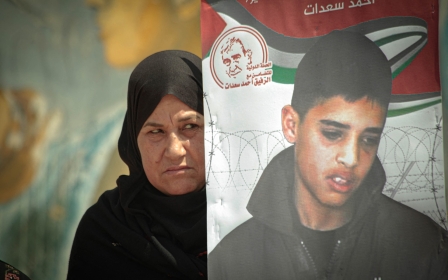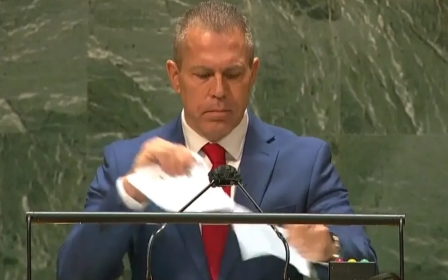Israel: Palestinian prisoner's health deteriorates after 100 days of hunger strike

A rights group warned on Friday of the deteriorating health of a Palestinian political prisoner on hunger strike for 100 days in an Israeli jail.
Khalil Awawda was moved from Ramle prison, where he was detained, to an Israeli hospital after his health deteriorated this week, the Palestinian Prisoners' Club said in a statement.
Qaddoura Fares, the head of the Prisoners' Club, told local media that the Israel Prison Service (IPS) used to move Palestinian prisoners to hospitals on their 50th day on hunger strike. However, in the case of Awawda, the IPS refused to move him and told him that he would only be hospitalised if he fell into a coma.
"[Israel] is employing the aches and pains and the health condition to put more pressure on him," Fares said.
Awawda, 40, is from Hebron, south of the occupied West Bank. His laywer, Jawwad Boulous, visited him on Monday in Ramle prison and described his condition as "very critical".
New MEE newsletter: Jerusalem Dispatch
Sign up to get the latest insights and analysis on Israel-Palestine, alongside Turkey Unpacked and other MEE newsletters
"He was vomiting during my visit and had difficulty seeing me, and he complained of sharp pains all over his body, in particular his muscles and limbs," Boulous said.
Awawda has been striking in protest against an Israeli administrative sentence of six months, issued against him in December 2021, the month he was arrested. The sentence ends on 26 June, but Israeli authorities have the power to issue another administrative detention order against him without charge, or put him on trial.
He has been arrested five times since 2005 for political activism, and has been placed in administrative detention three times. He is married and a father of four daughters.
Administrative detentions, a highly controversial policy used by Israel almost exclusively against Palestinians, allow detention without charge or trial for renewable periods of three to six months, without the possibility of appeal or of knowing what accusations are being levelled against the detainee.
Currently, there are around 4,500 Palestinian prisoners in Israeli jails.
Middle East Eye delivers independent and unrivalled coverage and analysis of the Middle East, North Africa and beyond. To learn more about republishing this content and the associated fees, please fill out this form. More about MEE can be found here.




